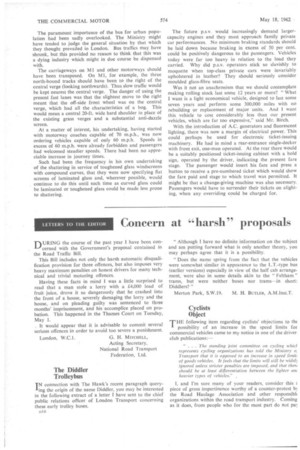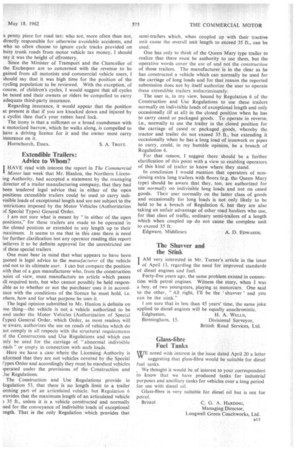Concern at "harsh" proposals
Page 66

Page 71

If you've noticed an error in this article please click here to report it so we can fix it.
DURING the course of the past year I have been concerned with the Government's proposal contained in the Road Traffic Bill.
This Bill includes not only the harsh automatic disqualification provision for three offences, but also imposes very heavy maximum penalties on honest drivers for many technical and trivial motoring offences.
Having these facts in mind I was a little surprised to read that a man stole a lorry with a £4,000 load of fruit juice, drove it so dangerously that he crashed into the front of a house, severely damaging the lorry and the house, and on pleading guilty was sentenced to three months' imprisonment, and his accomplice placed on probation. This happened in the Thames Court on Tuesday, May 1.
. It would appear that it is advisable to commit several serious offences in order to avoid too severe a punishment.
London, W.C.1. G. H. MITCHELL,
Acting Secretary, National Road Transport Federation, Ltd.
The Diddler Trolleybus
TN connection with The Hawk's recent paragraph queryling the origin of the name Diddler, you may be interested in the following extract of a letter I have sent to the chief public relations officer of London Transport concerning these early trolley buses.
D 1 6
"Although I have no definite information on the subject and am putting forward what is only another theory, you may perhaps agree that it is a possibility.
"Does the name spring from the fact that the vehicles were somewhat similar in appearance to the L.T.-type bus (earlier versions) especially in view of the half cab arrangement, were also in some details akin to the " Feltham " trams, but were neither buses nor trams—in short: Diddlers? "
Merton Park, S.W.19. M. H. BUTLER, A.M.Inst.T.
Cyclists Object
1HE following item regarding cyclists' objections to tit( possibility of an increase in the speed limits for commercial vehicles came to my notice in one of the driver club publications:— " . . . The standing joint committee on cycling whicl represents cycling organizations has told the Ministry o, Transport that it is opposed to an increase in speed limit, of goods vehicles. It feels that the limits will still be widelj ignored unless stricter penalties are imposed, and that then should be at least differentiation between the lighter an heavier types of vehicles." , I, and I'm sure many of your readers, consider this piece of gross impertinence worthy of a counter-protest b■ the Road Haulage Association and other responsibl( organizations within the road transport industry. Coming as it does, from people who for the most part do not pa■
a penny piece for road tax: who are, more often than not, directly responsible for otherwise avoidable accidents, and who so often choose to ignore cycle tracks provided on busy trunk roads from motor vehicle tax money, I should say it was the height of effrontery., Since the Minister of Transport and the Chancellor of the Exchequer are so concerned with the revenue to be gained from all motorists and commercial vehicle users, should say that it was high time for the position of the cycling population to be reviewed. With the exception, of course, of children's cycles, I would suggest that all cycles be taxed and their owners or riders be compelled to carry adequate third-party insurance.
Regarding insurance, it would appear that the position at present is that if you are knocked down and injured by a cyclist then that's your rotten hard luck.
The irony is that a milkman or a bread roundsman with a motorized barrow, which he walks along, is compelled to have a driving licence for it and the owner must carry insurance on it.
Hornchurch, Essex. S. A. TROTT.
Extendible Trailers: Advice to Whom?
I HAVE tread with interest the report in The Commercial
Motor last week that Mr. Hanlon, the Northern Licensing Authority, had accepted a statement by the managing director of a trailer manufacturing company, that they had been tendered legal advice that in either of the open positions extendible trailers could be used to carry indivisible loads of exceptional length and are not subject to the restrictions imposed by the Motor Vehicles (Authorization Special Types) General Order.
I am not sure what is meant by "in either of the open positions," for these trailers are made to be operated in the closed position or extended to any length up to their maximum. It seems to me that in this case there is need for further clarification lest any operator reading this report believes it to be definite approval for the unrestricted use these special trailers.
One must bear in mind that what appears to have been voted is legal advice to the matmfacturer of the vehicle ind not to its ultimate user. I can but compare the position Nith that of a gun manufacturer who, from the construction )oint of view, must manufacture an article which passes 111 required tests, but who cannot possibly be held respon;ible as to whether or not the purchaser uses it in accordtnce with the conditions of the licence he must hold, i.e. ,vhere, how and for what purpose he uses it.
The legal opinion submitted to Mr. Hanlon is definite on )ne thing—the vehicle is not a vehicle authorized to be ised under the Motor Vehicles (Authorization of Special rypes) General Order, which Order, as most readers will )e aware, authorizes the use on roads of vehicles which do lot comply in all respects with the structural requirements )f the Construction and Use Regulations and which can inly be used for the carriage of "abnormal indivisible oads " or empty in connection with such loads.
Here we have a case where the Licensing Authority is nformed that they are not vehicles covered by the Special Pypes Order and accordingly they must be standard vehicles )perated under the provisions of the Construction and Jse Regulations.
The Construction and Use Regulations provide in tegulation 53, that there is no length limit to a trailer orming part of an articulated vehicle, but Regulation 6 provides that the maximum length of an articulated vehicle s 35 ft., unless it is a vehicle constructed and normally tsed for the conveyance of indivisible loads of exceptional angth. That is the only Regulation which provides that semi-trailers which, when coupled up with their tractive unit cause the overall unit length to exceed 35 ft., can be used.
One has only to think of the Queen Mary type trailer to realize that there must be authority to use them, but the operative words cover the use of and not the construction of those trailers. The manufacturer is in the clear as he has constructed a vehicle which can normally be used for the carriage of long loads and for that reason the reported submission does not by itself authorize the user to operate these extendible trailers indiscriminately.
The user is, in my view, bound by Regulation 6 of the Construction and Use Regulations to use these trailers normally on indivisible loads of exceptional length and only occasionally (if at all) in the closed position when he has to carry cased or packaged goods. To operate in reverse, i.e., normally to use the trailer in the closed position for the carriage of cased or packaged goods, whereby the tractor and trailer do not exceed 35 ft., but extending it occasionally when he has a long load of ironwork or pipes to carry, could, in my humble opinion, be a breach of Regulation 6.
For that reason, I suggest there should be a further clarification of this point with a view to enabling operators of this kind of trailer to know where they stand.
In conclusion I would mention that operators of nonclosing extra long trailers with floors (e.g. the Queen Mary type) should be aware that they, too, are authorized for use normally on indivisible long loads and not on cased goods. Their user normally on the latter class of goods and occasionally for long loads is not only likely to be held to be a breach of Regulation 6, but they are also taking an unfair advantage of other road hauliers who use, for that class of traffic, ordinary semi-trailers of a length Which when coupled up do not cause the complete unit to exceed 35 ft.
Edgware, Middlesex A. D. EDWARDS.
The Shuvver and the Stink
I AM very interested in Mr. Turner's article in the issue of April 13, regarding the need for improved standards of diesel engines and fuel.
Forty-five years ago, the same problem existed in connection with petrol engines. Witness the story, when I was a boy, of two youngsters, playing at motorcars. One said to the other, "All right, I'll be the shuvver ' and you can be the stink."
I am sure that in less than 45 years' time, the same joke applied to diesel engines will be equally anachronistic.
Edgbaston, H. A. WELLS, Birmingham, 15. Divisional Surveyor, British Road Services, Ltd.
Glass-fibre Fuel Tanks
noted with interest in the issue dated April 20 a letter suggesting that glass-fibre would be suitable for diesel fuel tanks.
We thought it would be of interest to your correspondent to know that we have produced tanks for industrial purposes and ancillary tanks for vehicles over a long period for use with diesel oil.
Glass-fibre is very suitable for diesel oil but is not for petrol.
Bristol. C. G. A. HARDING, Managing Director, Longwell Green Coachworks, Ltd.




















































































































